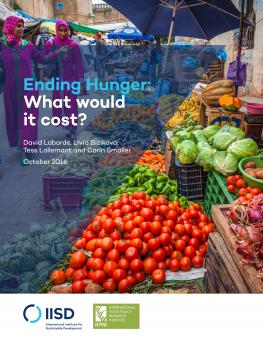
Ending Hunger: What would it cost?
The International Institute for Sustainable Development and the International Food Policy Research Institute joined forces to estimate what it would cost to end hunger, and the contribution that donors need to make.
The International Institute for Sustainable Development and the International Food Policy Research Institute joined forces to estimate what it would cost to end hunger, and the contribution that donors need to make.
Our analysis focused on the cost of ending hunger through increased spending on social safety nets directly targeting consumers, farm support to expand production and increase poor farmers’ income, and rural development that reduces inefficiencies along the value chain and enhances rural productivity. The research marks the first time that a multi-country macroeconomic model has been combined with household surveys.
We found that it will cost on average an extra USD 11 billion per year of public spending from now to 2030 to end hunger. USD 4 billion of the additional spending needs to come from donors. The remaining USD 7 billion will come from poor countries themselves. Importantly, this public spending will generate on average an additional USD 5 billion of private investment per year until 2030.
Participating experts
Additional downloads
You might also be interested in
The Responsible Agricultural Investment Tool for Agribusiness and Case Studies
This report summarizes a collaboration to support agribusinesses in complying with principles of responsible investment in agriculture and food systems.
Effective Public Investments to Improve Food Security
The world has made significant progress in reducing hunger over the past decade. But hunger remains a major challenge. This policy brief identifies the most effective and efficient ways to invest in improving food security.
Hunger Is On the Rise: Here are three ways to stop it
Hunger levels are rising. Carin Smaller explores how technology could help tackle climate change and end hunger.
Green Public Procurement in India
This report analyzes the status of green public procurement (GPP) in India and suggests key strategies for advancing sustainable procurement practices.